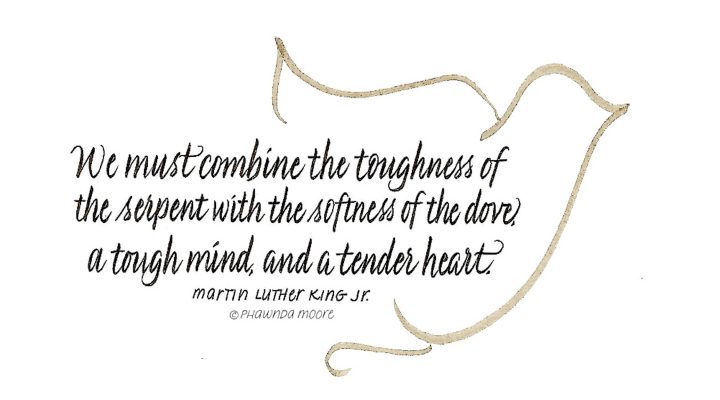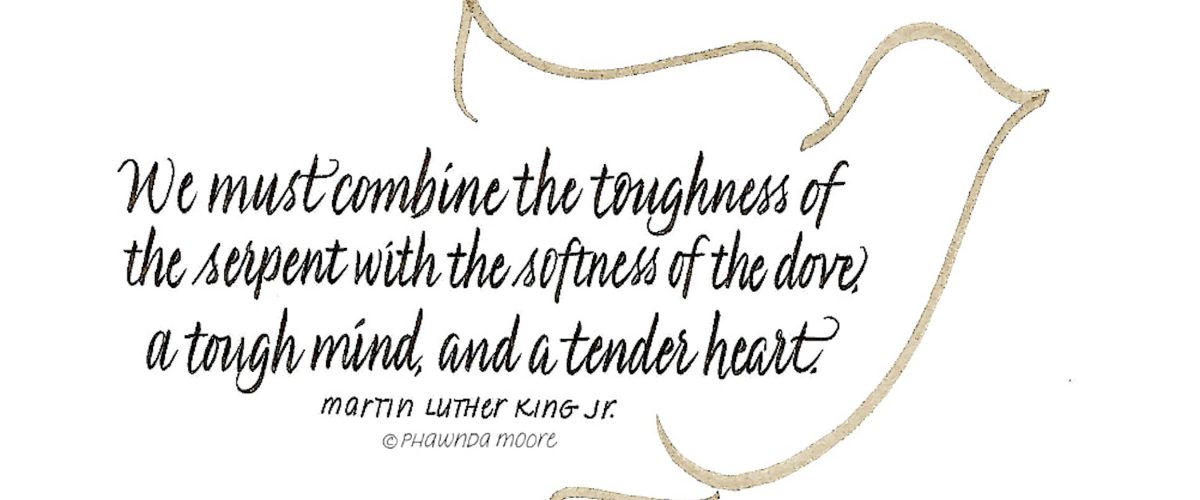Recently a pair of mourning doves chose a high shelf on the front of our home to build their nest. They flew back and forth for days, twigs in their beaks, cooing excitedly. When the delicate construction was complete, it even had a green leaf placed center front. We let the twig-littered porch be, and kindly invited guests to acknowledge this rather sacred event with us.
We felt chosen, which made us curious to learn about these sweet messengers from God. The new residents were named “Bella” and “Bernard.” I was pleased to discover, after the fact, that her name means devoted to God, and his originated from “bear” and means strength and courage.
I recalled that doves were often mentioned as models for us in the Bible: “Behold, I send you forth as sheep in the midst of wolves: be ye therefore wise as serpents, and harmless as doves” (Matthew 10:16).
As we know, Jesus (and others) was a symbol of peace in the world. Doves were present at Jesus’ baptism and crucifixion as symbols of God’s good news for man’s redemption. To Native Americans, doves are protectors; to Japanese they signal the end of war; and to Greeks, Aztecs and Mexican Indians, doves are symbols of love.

“Dove of Peace,” Picasso
Doves are also a call to peace for participating nations at Olympic Games. They’re released at weddings and funerals and decorate marchers’ messages in antiwar demonstrations.
Pablo Picasso often used doves in his art as symbols for peace.
MLK on doves
Martin Luther King Jr., however, looked beyond the doves’ symbolism and explored the deeper meaning of Matthew 10:16. In a message written 64 years ago, he referenced Gerald Hamilton Kennedy’s sermon, “The Mind and the Heart” for being both tough-minded and tender-hearted Christians, which is still significant today.
To begin, King targets the “hard-hearted among us who feel that the only way to deal with oppression is to rise up against the opponent with physical violence and corroding hatred.”
He clarifies we need “another way … that is tough-minded enough to resist evil (and is) tender-hearted to resist with love.”
Then he presents these seemingly opposing traits as complements, and illustrates how they actually enhance one another, much like devotion, strength and courage.
‘Hard, serious thinking’
We need to hear this more often. King points out this ideal Christian model is neither being soft-minded nor violent nor bitter, yet admits “very few people” achieve it because one has to be “willing to engage in hard, serious thinking.”
Unfortunately, many are driven to easy answers, because of an “unbelievable gullibility.” There’s a tendency to accept, for example, any printed word in the press as proven truth, not to research facts to see that “truth can be distorted.” Some believe if one is nice (note the absence of this word in Mathew 10:16), they should be reluctant to resist or confront manipulated “truth” with facts.
The soft-minded person finds security in the status quo. King cites some examples of their irrational fears and beliefs:
- Friday the 13th and black cats
- Change, new ideas
- Higher criticism of the Bible
- Reason in religion
- Believing there is a conflict between science and religion
- Blindly supporting authoritative politicians and dictators
- Racial prejudice, fear of intermarriage, white superiority
C.S. Lewis said: “One of the most cowardly things ordinary people do is to shut their eyes to facts.”
In 1959, MLK observed: “There is little hope for us in our personal or collective lives until we become tough-minded enough to rise above the shackles of half-truth and legends. The shape of the world today does not permit us the luxury of soft-minded.”
“A nation of soft-minded men is purchasing its own spiritual death through an installment plan.”
He predicted: “A nation of soft-minded men is purchasing its own spiritual death through an installment plan.”
Strength to love
The beauty of God’s intent is having both traits, a tough mind and a tender heart. In his book Strength to Love, King’s words mirror the dictionary’s definition: strong, determined, able to face up to reality.
“Let us consider, first, the need for a tough mind, characterized by incisive thinking, realistic appraisal and decisive judgment. The tough mind is sharp and penetrating, breaking through the crust of legends and myths and sifting the true from the false. The tough-minded individual is astute and discerning.
“He (or she) has a strong, austere quality that makes for firmness of purpose and solidness of commitment. … Nothing pains some people more than having to think.”
King’s concept is embraced on the Twitter chat of MedHumChat (short for Medical Humanities Chat) where the medical profession strives to foster reflection, empathy and connection in health care through engagement with the arts and humanities.
In a selected excerpt about King, they remind us that “Jesus recognized the need for blending opposites. He knew that his disciples would face a difficult and hostile world, where they would confront the recalcitrance of political officials and the intransigence of the protectors of the old order.
“It is pretty difficult to imagine a single person having, simultaneously, the characteristics of the serpent and the dove, but this is what Jesus expects.”
“He knew that they would meet cold and arrogant men whose hearts had been hardened by the long winter of traditionalism. So he said to them, ‘Behold, I send you forth as sheep in the midst of wolves.’ And he gave them a formula for action, ‘Be ye therefore wise as serpents, and harmless as doves.’
“It is pretty difficult to imagine a single person having, simultaneously, the characteristics of the serpent and the dove, but this is what Jesus expects.”
And, quoting King here: “We must combine the toughness of the serpent and the softness of the dove, a tough mind and a tender heart.”
This Scripture does not point to a single choice; we have permission to be both. King continues his message by saying: “The greatness of our God lies in the fact that he is both tough-minded and tender-hearted,” citing God’s masculinity in tough-mindedness and God’s tender-heartedness in a genteel femininity. “He possesses the firmness of a father and the softness of a mother.”
Doves facing down evil
How, then, do we peace-seeking “doves” deal with evil in the world?
“There are times when we need to know that God is a God of justice,” King wrote. “When evil forces rise to the throne and slumbering giants of injustice rise up in the earth, we need to know that there is a God of Justice who can cut them down like a green hay there and leave them withering like the grass.

Bella
“But there are times when we need to know that God is a God of love and mercy,” he said. When we battle disappointment and adversity, “there is Someone who loves us, who understands, and who can and will give us another chance.”
Finally, King put these times in perspective: “When days grow dark and nights grow dreary, we can be thankful that our God is not a one-sided incomplete God, but he combines in his nature a creative synthesis of love and justice which can lead us through life’s dark valley to sunlit paths of hope and fulfillment.”
Inspired by our research, back here at home weeks later, mystery surrounds Bella and Bernard. Their vacant nest with a green leaf awaits their return. In the meantime, it’s a visible reminder of the God we serve, aiming for a tough mind and a tender heart. May we find that balance as often as possible.

Phawnda Moore
Phawnda Moore is a Northern California artist and award-winning author of Lettering from A to Z: 12 Styles & Awesome Projects for a Creative Life. In living a creative life, she shares spiritual insights from traveling, gardening and cooking. Find her on Facebook at Calligraphy & Design by Phawnda and on Instagram at phawnda.moore.


